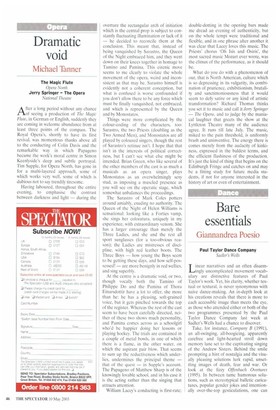Dramatic void
Michael Tanner
The Magic Flute Opera North Jerry Springer – The Opera National Theatre After a long period without any chance of seeing a production of The Magic Flute, in German or English, suddenly they are coming in welcome abundance from at least three points of the compass. The Royal Opera's, shortly to have its first revival, was momentous thanks above all to the conducting of Colin Davis and the remarkable way in which Papageno became the work's moral centre in Simon Keenlyside's deep and subtle portrayal. Tim Supple, for Opera North, has gone in for a multi-layered approach, some of which works very well, some of which is dubious not to say trendily tiresome.
Having laboured, throughout the entire evening, to emphasise the contrast between darkness and light — during the overture the rectangular arch of initiation which is the central prop is subject to constantly fluctuating illumination or lack of it — he decided to reconcile them at the conclusion. This meant that, instead of being vanquished by Sarastro, the Queen of the Night embraced him, and they went down on their knees together in homage to Tamino and Pamina. This eirenic move seems to me clearly to violate the whole movement of the opera, weird and inconsistent as that may be. Sarastro himself is evidently not a coherent conception, but what is confused is worse confounded if you don't allow there to be any force which must he finally vanquished, not embraced, and which is represented by the Queen and by Monostatos.
Things were more complicated by the colour-coding of the characters, too: Sarastro, the two Priests (doubling as the Two Armed Men), and Monostatos are all played by coloured singers, though the rest of Sarastro's retinue isn't. I hope that that isn't in the interests of political correctness, but I can't see what else might be intended. Brian Green, who like several of the other members of the cast is as much a musicals as an opera singer, plays Monostatos as an overwhelmingly sexy stud, as imposing a muscled presence as you will see on the operatic stage, which somewhat unbalances the proceedings.
The Sarastro of Mark Coles potters around amiably, exuding no authority. The Queen of the Night of Helen Williams is sensational: looking like a Forties vamp, she sings her coloratura, uniquely in my experience, with extraordinary venom. She has a larger entourage than merely the Three Ladies, and she and the rest all sport sunglasses (for a too-obvious reason); the Ladies are mistresses of discipline, with high red leather boots. The Three Boys how young the Boys seem to be getting these days, and how self-possessed! — are more benignly in red wellies, and sing superbly.
At the centre is a dramatic void, or two, though vocally both the Tamino of Philippe Do and the Pamina of Thora Einarsdottir have a lot to offer, she more than he: he has a pleasing, soft-grained voice, but it gets pinched towards the top of the register. Whereas the rest of the cast seem to have been carefully directed, neither of these two shows much personality, and Pamina comes across as a schoolgirl who'd be happier doing her lessons or playing hockey. The trials are contained in a couple of metal bowls, in one of which there is a flame, in the other water, on which the aspirant pair blow. That seems to sum up the reductiveness which underlies, undermines the principal theme — that of the quest — in Supple's account. The Papageno of Matthew Sharp is of the knowingly lovable school, and in his case it is the acting rather than the singing that attracts attention. double-dotting in the opening bars made me dread an evening of authenticity, but on the whole tempi were traditional and flexible, and in one phrase after another it was clear that Lacey loves this music. The Priests' chorus 'Oh Isis and Osiris', the most sacred music Mozart ever wrote, was the climax of the performance, as it should be.
What do you do with a phenomenon of our, that is North American, culture which is so depressing in its vulgarity, its combination of prurience, exhibitionism, brutality and sanctimoniousness that it would seem to defy satire or any kind of artistic transformation? Richard Thomas thinks you set it to music and call it Jerry Springer — The Opera, and to judge by the maniacal laughter that greets the show at the Lyttleton Theatre many of the audience agree. It runs till late July. The music, miked to the pain threshold, is uniformly brash and uninventive. The energy there is comes merely from the audacity of kinkiness, expressed in the baldest terms, and the efficient flashiness of the production. It's just the kind of thing that begins on the Edinburgh Fringe and catches on and may be a fitting study for future media students, if not for anyone interested in the history of art or even of entertainment.


































































 Previous page
Previous page